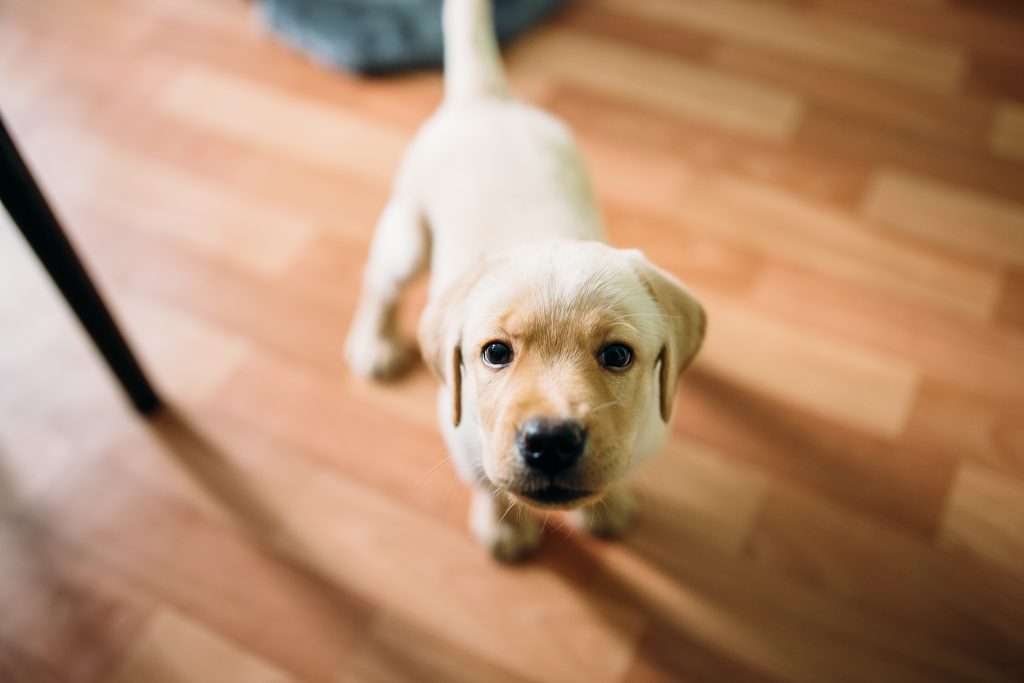Are you desperate for a dog, but concerned that your apartment cannot adequately accommodate your pup’s needs? While this is a valid concern and something you should thoroughly consider before committing to getting a dog, there are a variety of dog breeds that can adapt well to apartment style living.
There are a number of factors to consider when picking a pooch that will love living in a cozy apartment. Although the natural assumption is that you can only get a small dog, there are multiple characteristics and dispositions to take into consideration as well. In addition to the size of the dog and amount of available space, you should be mindful of your pup’s noise level, amount of energy, overall sociability, and personality.
Not only do you want your dog to physically fit into your space, but you also want to ensure that your dog is comfortable with neighbors (both people and other pets). After carefully considering these characteristics and selecting a breed that will work well with your lifestyle, you are ready to bring home your newest roommate!
Selecting a Size
It may seem obvious, but oftentimes it is more practical to get a small dog when you live in a small space. To a small dog, an apartment can still be a large enough area for him or her to run around and play. Small dogs can maneuver through an apartment with ease, unlike large dogs who may have trouble squeezing through confined spaces, knocking into furniture in the process.
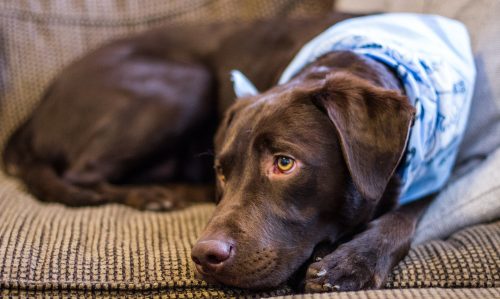
Selecting a small dog to live in an apartment is typically more practical not only because of their size, but also because of the size of their dog bed, crate, and playing space. However, not every small dog breed will mesh well with an apartment lifestyle.
Small apartment, small dog—that’s the logic, right? Although this is true in many cases, the size of the dog does not necessarily mean that he or she will be comfortable living in an apartment. Small dogs physically fit well in apartments, but not all of them will thrive in this community environment.
Many small dog breeds are very vocal, otherwise known as “yappy.” In an apartment where you are most likely sharing walls with neighbors, getting a dog that is prone to barking is not a wise idea. If your small dog is constantly barking, he or she may disrupt your neighbors, leading to complaints to the landlord or apartment manager. Some small dog breeds that are particularly prone to barking include Chihuahuas, Cairn Terriers, Miniature Schnauzers, Scottish Terriers, West Highland White Terriers (Westies), Yorkshire Terriers (Yorkies), Fox Terriers, Beagles, Silky Terriers, Pekingese, and Miniature Poodles.
On the other hand, if you have a small dog that is on the quiet side, he or she would be an excellent fit for an apartment. Small dog breeds that are typically quieter include the French Bulldog, Maltese Shih Tzu, Basenji, Cavalier King Charles Spaniel, Coton de Tulear, Italian Greyhound, Norwegian Lundehund, Japanese Chin, Shiba Inu, English Toy Spaniel, and the Chinese Crested. Although every dog has his or her own unique personality, these particular small breeds tend to be quieter than others.
In addition to your small dog’s vocal level, you should also consider his or her level of energy. When finding the best dog breeds for apartments, you should try to select a calmer, mellower furry friend. A small, low-energy dog will be perfectly content lounging on the couch and occasionally playing in an apartment. For a tiny dog with a relaxed personality, an apartment is the perfect space for him or her to thrive.
Some calm dog breeds that do not need a whole house to run through include the Pug, Puggle, Bulldog, Rat Terrier, Brussels Griffon, English Cocker Spaniel, Shih Tzu, Sealyham Terrier, Boston Terrier, Pembroke Welsh Corgi, Havanese, Bichon Frise, Skye Terrier, Lhasa Apso, Lowchen, and the Bedlington Terrier.
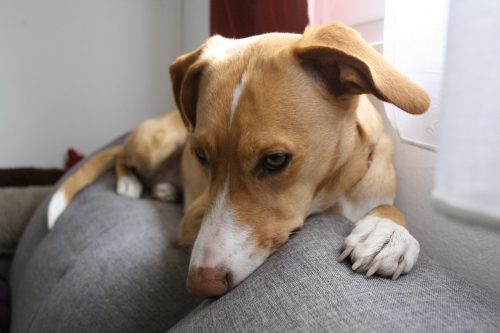
Although these breeds are typically low-energy, part of being a responsible pet owner means ensuring that your dog gets plenty of exercise and playtime. Even though these dogs will be comfortable in an apartment, they all still love to get out for regular walks or a trip to the dog park.
Alternately, even though small dogs proportionally fit more comfortably into compact living spaces, some small dog breeds need more room to exercise and play. When selecting a dog for your apartment, you should ensure that you do not get a high-energy dog that will feel cooped up.
A high-energy dog in an apartment can lead to scratched doors, damaged furniture and an unhappy hound. Small dog breeds that tend to have more energy are the Affenpinscher, Miniature Pinscher, Schipperke, Pocket Beagle, Jack Russell Terrier, Border Terrier, Australian Terrier, Manchester Terrier, Lakeland Terrier, Norfolk Terrier, and the Welsh Terrier.
Again, all dogs have unique personalities, but generally speaking, these small dog breeds are high-energy. When picking out your perfect pooch, the goal should be finding a breed that checks all of the boxes.
It is a common misconception that large dogs cannot live in apartments. A big ball of energy in a tiny apartment is a recipe for disaster, but some large dog breeds prefer taking it easy. Due to their sheer size, sometimes there is not enough physical space for a large dog, but if you select a low-energy, large dog, he or she will be completely comfortable lounging on the couch for most of the day.
Most of these breeds will come as a complete surprise due to their size, but with a morning walk and plenty of afternoon exercise, these big bundles of love are happy relaxing.
Large dog breeds that are apartment friendly include the Great Dane, Greyhound, Basset Hound, Mastiff, Irish Wolfhound, Standard Poodle, Chinese Shar-Pei, and the Rhodesian Ridgeback. Although it is never okay to leave your dog cooped up all day, these large dog breeds are happy with apartment living when paired with plenty of outdoor exercise.
Consider Your Pup’s Personality
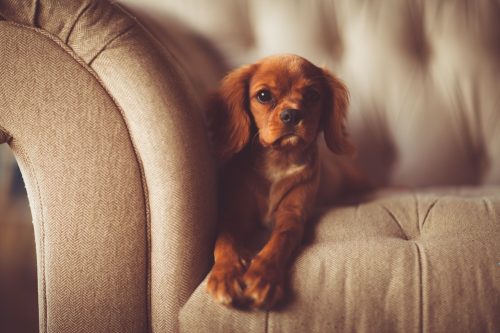
Living in an apartment not only means having limited space, but it also means being respectful of your neighbors and apartment community. Some complexes will not allow dogs altogether, so check with your landlord before taking your new canine companion home. If your complex allows dogs, it is still important to be considerate of both your neighbors and your dog.
Many dogs are social butterflies, whereas others are overwhelmed by large groups of people and other pets. A dog with an outgoing personality is key if you live in an apartment. Having a dog that is scared of the neighbors will not be fun for your dog or for other residents.
A few dog breeds that love being social are the Cavalier King Charles Spaniel, Beagle, Boxer, Boston Terrier, Staffordshire Bull Terrier, Poodle, Petit Basset Griffon Vendeen, Pembroke Welsh Corgi, Irish Setter, and the Labrador Retriever. However, getting a friendly dog is not the only factor to consider. If these dogs are active or noisy, they will not be a good fit for an apartment. Look for a dog that fits all of the criteria such as a King Charles Spaniel or an Italian Greyhound.
It is also important to note that your dog’s history will greatly impact his or her personality. If a puppy is adequately socialized, he or she should be comfortable living in a community setting. On the other hand, even the friendliest of breeds can shy away from strangers and other animals if he or she has experienced unpleasant scenarios in the past. Make sure you are confident in your dog’s personality before committing to living in an apartment.
Based on a study conducted by the American Temperament Test Society (ATTS), there are certain dog breeds that tend to be more aggressive and unfriendly. Of course, there are always exceptions to the rule, and with proper training, any dog can be a loving creature. However, particular dog breeds have been categorized as more aggressive than others, which may make them unsuitable for living in an apartment with plenty of neighbors.
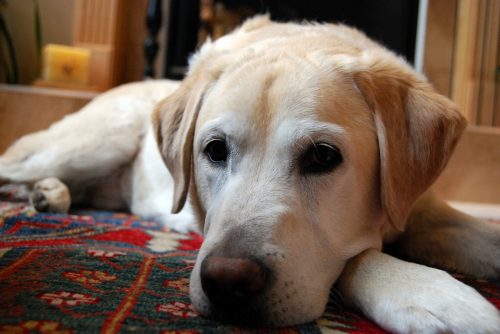
These typically aggressive dogs include the Chihuahua, Dachshund, Chow Chow, Doberman Pinscher, Dalmatian, Rottweiler, German Shepherd, American Pit Bull Terrier, and the Siberian Husky. Again, all dogs are different and their disposition will depend greatly on their history and training, so all of these breeds also have potential of being docile and friendly. However, stereotypically speaking, you may want to avoid these breeds when looking for a dog that will thrive in an apartment setting.
Noisy Neighbors
One of the primary reasons that issues arise between dog owners and neighbors is noise. When a dog is left alone for the day, he or she may get anxiety, which leads to whining and barking. Some dogs bark at people and cars that pass by, annoying neighbors looking for peace and quiet. When problems like this occur, the apartment manager or landlord gets involved, typically siding with the resident without a dog.
Stop this complication before it happens by getting a pup that fairs on the quiet side. Some breeds that work well with apartment life and tend to be less vocal include the Basenji, Bulldog, Bullmastiff, Chinese Shar-Pei, Chinook, Coton de Tulear, French Bulldog, Greyhound, Maltese Shih Tzu, and the Newfoundland. Each dog is different and training your dog not to bark plays a large role, but these dogs are normally less noisy.
Dogs bark for a variety of reasons. Sometimes it is as a warning or out of aggression, but often it is out of happiness or excitement. There is nothing wrong with a noisy pup; however, your neighbors might not have the same opinion. Before moving your dog into an apartment, think about his or her noise level.
Follow the Rules
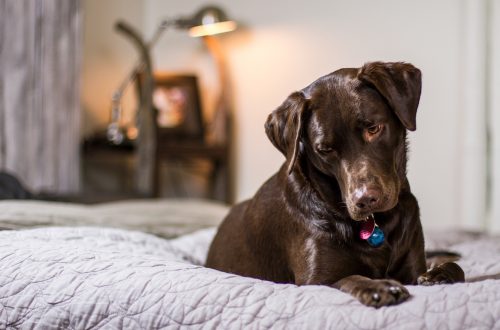
One of the primary reasons that dogs end up in shelters is because his or her owner’s living situation cannot accommodate a dog. If you already live in an apartment and you are considering getting a new four-legged friend, do not try to bend the rules by going behind your landlord’s back.
Although you may get away with having a lovable pup as a roommate for a while, chances are that your landlord will find out sooner or later. In this case, either you and your dog will be forced to find new space that allows pets, or you will be forced to get rid of your pup. This is a very heartbreaking situation, but unfortunately it happens far too often. You want to live in a space where both you and your dog are welcome, so consider your apartment’s rules to avoid getting yourself into a sticky situation.
The Perfect Roommate
Overall, the best dog breeds for apartment dwellers according to the American Kennel Club are the Bichon Frise, Bulldog, Cavalier King Charles Spaniel, Chinese Crested, French Bulldog, Greyhound, Havanese, Maltese, Pug, and Shih Tzu. However, there are many breeds that can fit into an apartment lifestyle.
When searching for the perfect canine companion, there are a few characteristics to be on the lookout for. The first characteristic to consider is size. Will your dog fit comfortably in your tiny home? The second characteristic to monitor its activity level. If your dog is a couch potato, he or she will be a perfect fit for an apartment. On the other hand, if your dog is bursting with energy, he or she needs a large house and yard to exercise in.
The third factor to consider is your pup’s personality. If your dog does not like being in social settings, an apartment will be an overwhelming and uncomfortable space. Finally, think about your dog’s noise level including barking, whining, and howling. To avoid conflict with neighbors, look for a pup that is less chatty. If you have a dog that meets these criteria, you are ready to move into an apartment with your new roommate!

